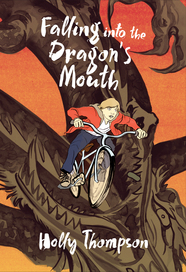Despite efforts to eradicate it, bullying remains a problem in schools, communities, workplaces, and online. Holly Thompson’s debut middle grade novel in verse, Orchards, portrays a seventh grader whose bullying of a former friend contributed to that girl’s suicide, an act for which the half-Japanese protagonist is sent to family in Japan as a kind of penance. Among other things, the protagonist of Orchards experiences exclusion and some bullying herself as a foreigner who is also seen as having humiliated the family with her actions.
 In her third verse novel, this one again for middle graders, Thompson, who lives in Japan, returns to the subject of bullying and shows readers the depth of the problem in that country. The main character of Falling into the Dragon’s Mouth, 12-year-old Jason Parker, is the oldest student in his sixth grade class and the only foreigner. While the clueless teacher “seems to think / I can fend for myself / since I’m a year older / having repeated a grade / when we moved to Japan,” Jason sees himself as “the nail / that sticks out / just waiting / to be hammered down.” When the students are assigned to study groups, Jason ends up with five classmates known for their cruelty and violence.
In her third verse novel, this one again for middle graders, Thompson, who lives in Japan, returns to the subject of bullying and shows readers the depth of the problem in that country. The main character of Falling into the Dragon’s Mouth, 12-year-old Jason Parker, is the oldest student in his sixth grade class and the only foreigner. While the clueless teacher “seems to think / I can fend for myself / since I’m a year older / having repeated a grade / when we moved to Japan,” Jason sees himself as “the nail / that sticks out / just waiting / to be hammered down.” When the students are assigned to study groups, Jason ends up with five classmates known for their cruelty and violence.
Like many bullied children, Jason comes home with headaches and bruises from his classmates’ fists and feet. He tells his overworked parents that he slipped and fell because he knows they don’t yet have the money to send him to the international school. Obliged to watch his younger sister once a week in the afternoon, he takes her to different places in their small town outside Tokyo. There they witness an arson that involves the family of one of the study group bullies and meet a teenage Japanese boy, Daiki, who had to quit school because of bullying after his brother had a nervous breakdown that led to the entire family’s ostracism.
Unable to get help from either his parents or his teachers, Jason’s grades drop. One of his allies joins the bullies. Jason tries to remain silent and invisible, but the attacks become increasingly life-threatening.
The verse is simple, with short, easily read lines that convey the terseness and power of Japanese poetry. Thompson’s language is vivid and concrete but also with a metaphysical element as Jason learns the philosophy and practice of the defensive martial art Aikido. Falling into the Dragon’s Mouth joins a growing body of literature on bullying across cultures, along with Rita Williams-Garcia’s Jumped and Meg Medina’s Yaqui Delgado Wants to Kick Your Ass. Thompson portrays the specific elements of Japanese culture that contribute to both Jason’s and Daiki’s bullying – for instance, the suspicion of foreigners and the idea that one’s actions reflect on the entire family unit. Ultimately, though, bullying is not a consequence-free act, as those who torment Jason end up paying a price. This price points to how bullying can be prevented in a community that wants to hammer down those who don’t fit in.
By exploring bullying within a specific culture, Falling into the Dragon’s Mouth offers universal insights as well. Thompson shows that the pain experienced by the one bullied is universal, as is the instinct of others to remain silent (or join in) lest they be next. The importance of aware and caring adults who are alert to the signs and ready to step in cuts across cultures. Above all, the novel shows that everywhere it happens, bullying is not an isolated event but exists in a society that has the power both to exacerbate it or stop it.